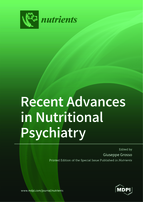Recent Advances in Nutritional Psychiatry
A special issue of Nutrients (ISSN 2072-6643). This special issue belongs to the section "Nutrition and Public Health".
Deadline for manuscript submissions: closed (31 December 2020) | Viewed by 105301
Special Issue Editor
Interests: coffee; meta-analysis; Mediterranean diet; polyphenols; polyphenol-rich foods
Special Issues, Collections and Topics in MDPI journals
Special Issue Information
Dear Colleagues,
Mental health disorders represent a major public health issue due to their impact on years lived with disability and cross-talk with other non-communicable diseases such as cancer, cardiovascular diseases, and diabetes. Importantly, most of these conditions can be prevented by implementing healthy dietary habits. Consequently, a recently developed field of psychiatry, “nutritional psychiatry”, is focused on investigating the relationships among dietary factors, eating habits and mental disorders in order to form methods for the prevention and treatment of mental disorders.
This Special Issue of Nutrients will focus on both observational and molecular studies that investigate the effects of nutrients, foods, and whole dietary patterns on mental health. We invite authors to submit reviews and studies providing evidence of the effects of nutritional factors on cognitive function, depression, sleep patterns, stress and quality of life.
Prof. Dr. Giuseppe Grosso
Guest Editor
Manuscript Submission Information
Manuscripts should be submitted online at www.mdpi.com by registering and logging in to this website. Once you are registered, click here to go to the submission form. Manuscripts can be submitted until the deadline. All submissions that pass pre-check are peer-reviewed. Accepted papers will be published continuously in the journal (as soon as accepted) and will be listed together on the special issue website. Research articles, review articles as well as short communications are invited. For planned papers, a title and short abstract (about 100 words) can be sent to the Editorial Office for announcement on this website.
Submitted manuscripts should not have been published previously, nor be under consideration for publication elsewhere (except conference proceedings papers). All manuscripts are thoroughly refereed through a single-blind peer-review process. A guide for authors and other relevant information for submission of manuscripts is available on the Instructions for Authors page. Nutrients is an international peer-reviewed open access semimonthly journal published by MDPI.
Please visit the Instructions for Authors page before submitting a manuscript. The Article Processing Charge (APC) for publication in this open access journal is 2900 CHF (Swiss Francs). Submitted papers should be well formatted and use good English. Authors may use MDPI's English editing service prior to publication or during author revisions.
Keywords
- Mediterranean diet
- polyphenols
- nutrition
- diet
- nutritional psychiatry
- mental health
- cognitive disorders
- dementia
- stress
- depression
- quality of life
- sleep







